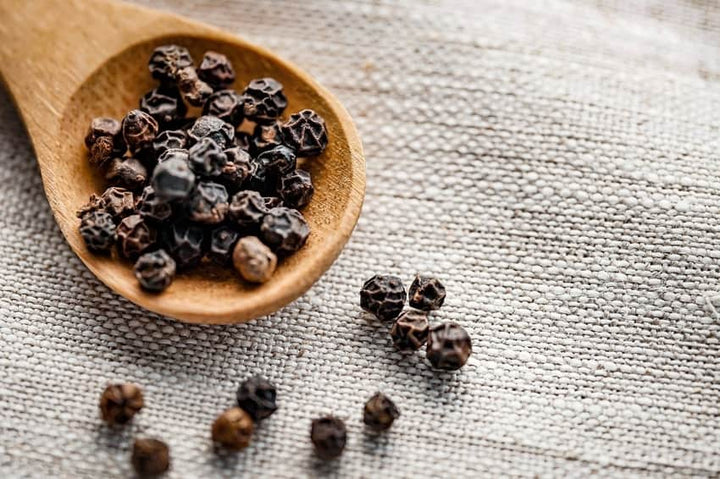Discover the amazing health benefits of black pepper, from boosting digestion to improving brain function and supporting heart health. A small spice with big advantages!

Black pepper is one of the most common and widely used spices in the world, yet many people are unaware of its numerous health benefits. Beyond its ability to enhance the flavor of meals, black pepper contains a rich array of nutrients and compounds that can provide valuable health benefits. Here’s why you should consider adding more black pepper to your diet.
Rich in Nutrients
Black pepper is packed with essential nutrients, despite being used in small quantities. It’s an excellent source of vitamins and minerals like vitamin K, iron, calcium, magnesium, and potassium. These nutrients play critical roles in supporting overall health, such as promoting strong bones, improving blood circulation, and maintaining healthy muscle function.
Boosts Digestion
Black pepper has been used for centuries to improve digestion. It stimulates the production of stomach acids, which aids in breaking down food more effectively. This makes it especially useful for people experiencing indigestion or bloating. Additionally, the compound piperine, found in black pepper, has been shown to enhance the bioavailability of nutrients, meaning that it helps the body absorb more nutrients from the food you eat.
Supports Weight Loss
If you’re looking to shed a few pounds, black pepper could be your ally. Piperine, the active compound in black pepper, has been shown to promote fat breakdown and prevent the formation of new fat cells. It can also increase metabolic rate and enhance fat burning. Adding black pepper to your meals can therefore support your weight loss efforts, especially when combined with a balanced diet and regular exercise.
Improves Brain Function
Black pepper’s piperine content also has positive effects on brain health. Studies have suggested that piperine can improve cognitive function and may even help in managing conditions such as Alzheimer’s disease. It is believed to work by increasing the levels of certain neurotransmitters in the brain, such as serotonin and dopamine, which are crucial for mood, focus, and memory. Regular consumption of black pepper may therefore help keep your mind sharp as you age.
Contains Antioxidants
Black pepper is an excellent source of antioxidants, which help to protect the body from oxidative stress and free radical damage. These antioxidants can reduce the risk of chronic diseases, including heart disease and cancer. Additionally, antioxidants in black pepper can help fight inflammation in the body, promoting a healthier immune system and reducing the risk of infections and inflammatory diseases.
Supports Immune System Health
Black pepper contains antibacterial properties that can help fight infections. Its essential oils are known to have antimicrobial effects, making black pepper a natural defense against common illnesses like colds and flu. It also has anti-inflammatory properties that help to strengthen the immune system, allowing the body to defend itself more effectively against pathogens.
Improves Skin Health
The antioxidants and anti-inflammatory properties of black pepper aren’t just good for internal health; they also benefit your skin. The antimicrobial properties can help treat acne and prevent breakouts, while the antioxidant content supports healthy aging by reducing the formation of wrinkles and fine lines. Black pepper can also help improve the absorption of skincare products that contain essential nutrients.
Potential Cancer-Fighting Properties
Emerging research suggests that black pepper’s piperine content may help reduce the risk of cancer. Some studies have shown that piperine can inhibit the growth of cancer cells and prevent the spread of tumors. Though more research is needed, these early findings indicate that incorporating black pepper into your diet could potentially offer protective benefits against certain types of cancer.
Improves Respiratory Health
Black pepper has a long history of use as a remedy for respiratory issues such as asthma, coughs, and sinusitis. The spice has expectorant properties, which means it helps to loosen mucus from the airways, making it easier to expel and improving breathing. Its antibacterial properties may also help combat respiratory infections that often lead to chronic conditions like bronchitis or pneumonia.
Supports Heart Health
Studies suggest that black pepper can support heart health by improving blood circulation and regulating cholesterol levels. Piperine has been shown to reduce bad cholesterol (LDL) while boosting the levels of good cholesterol (HDL). This balance is crucial for preventing heart disease and promoting cardiovascular well-being.

Black pepper is much more than a kitchen staple—it’s a powerful spice that offers numerous health benefits. From boosting digestion and aiding weight loss to protecting the brain and supporting the immune system, black pepper is a versatile addition to your diet. Whether sprinkled on your meals or added to smoothies, this humble spice is a natural way to enhance your overall health and well-being. So, the next time you reach for the pepper shaker, remember that you’re not just seasoning your food—you’re nourishing your body too.
If you want to read more about this topic, click the following page.
To learn more about the different varieties of Pepper, check the following link.